
ethical
This is the live website of The Institute for Ethical AI & ML, as well as The 8 Principles for Machine Learning.
Stars: 52
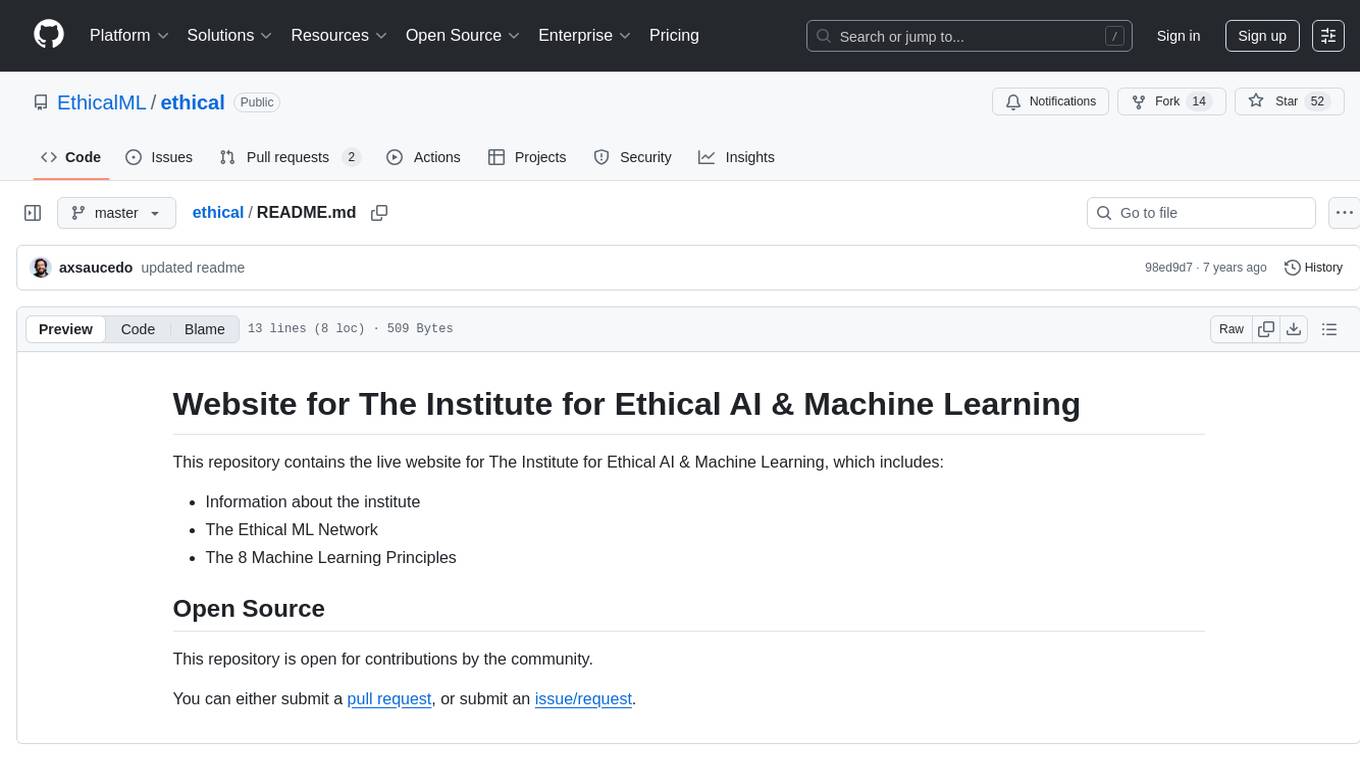
The repository 'ethical' contains the live website for The Institute for Ethical AI & Machine Learning. It provides information about the institute, the Ethical ML Network, and the 8 Machine Learning Principles. The repository is open for contributions by the community through pull requests or issue submissions.
README:
This repository contains the live website for The Institute for Ethical AI & Machine Learning, which includes:
- Information about the institute
- The Ethical ML Network
- The 8 Machine Learning Principles
This repository is open for contributions by the community.
You can either submit a pull request, or submit an issue/request.
For Tasks:
Click tags to check more tools for each tasksFor Jobs:
Alternative AI tools for ethical
Similar Open Source Tools

ethical
The repository 'ethical' contains the live website for The Institute for Ethical AI & Machine Learning. It provides information about the institute, the Ethical ML Network, and the 8 Machine Learning Principles. The repository is open for contributions by the community through pull requests or issue submissions.
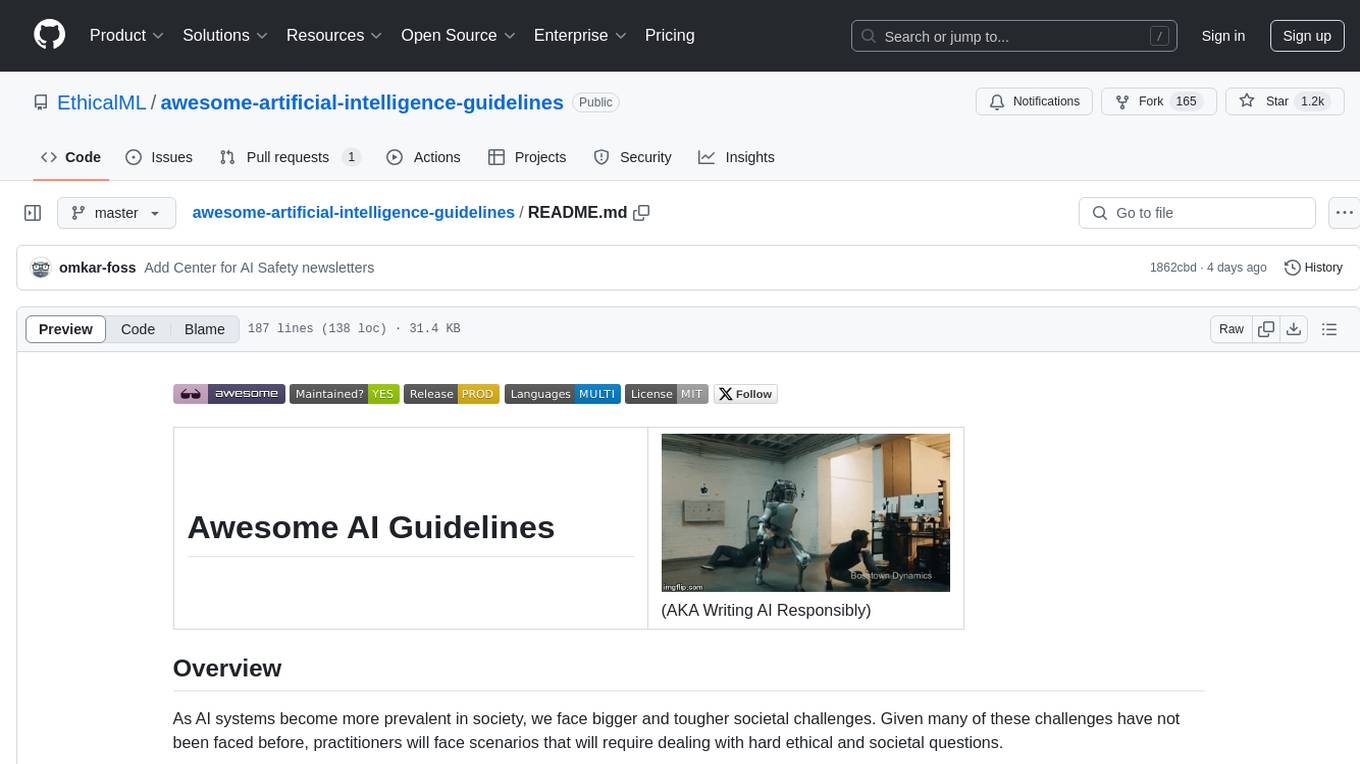
awesome-artificial-intelligence-guidelines
The 'Awesome AI Guidelines' repository aims to simplify the ecosystem of guidelines, principles, codes of ethics, standards, and regulations around artificial intelligence. It provides a comprehensive collection of resources addressing ethical and societal challenges in AI systems, including high-level frameworks, principles, processes, checklists, interactive tools, industry standards initiatives, online courses, research, and industry newsletters, as well as regulations and policies from various countries. The repository serves as a valuable reference for individuals and teams designing, building, and operating AI systems to navigate the complex landscape of AI ethics and governance.
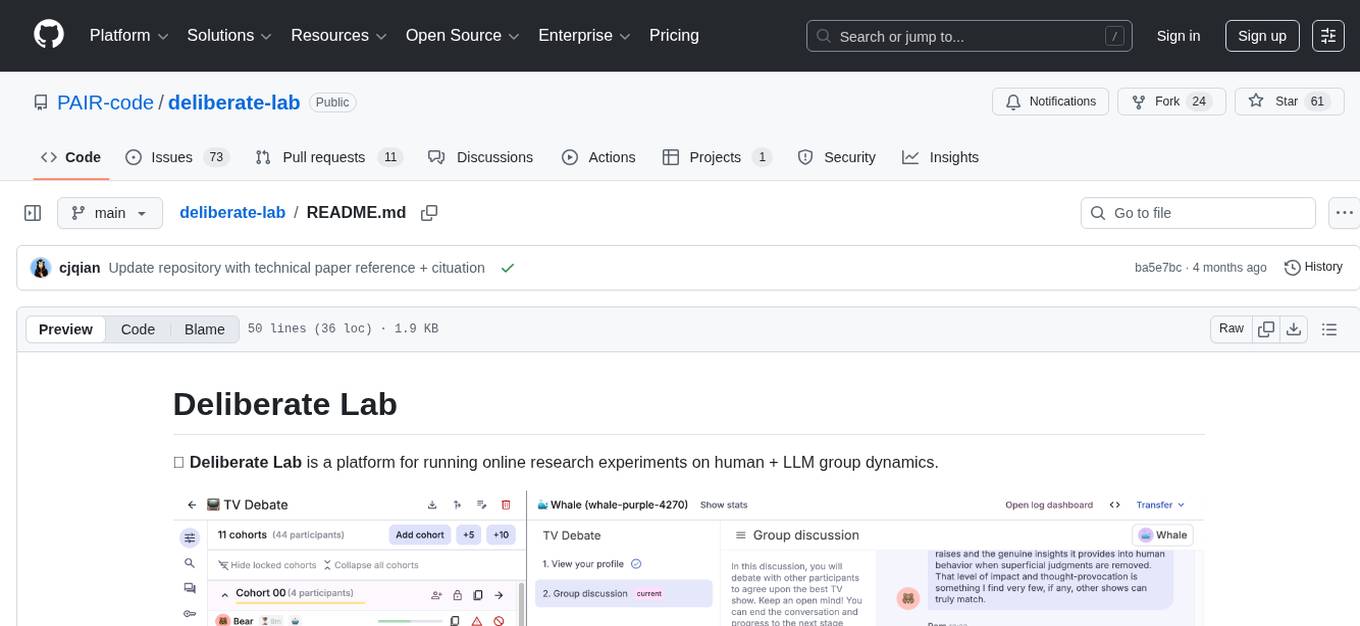
deliberate-lab
Deliberate Lab is a platform designed for conducting online research experiments focusing on human and LLM group dynamics. It provides documentation for researchers and developers, offers a quick start guide for developers, and includes a technical paper. The platform allows users to run real-time human-AI social experiments and provides tools for analyzing group interactions and dynamics.
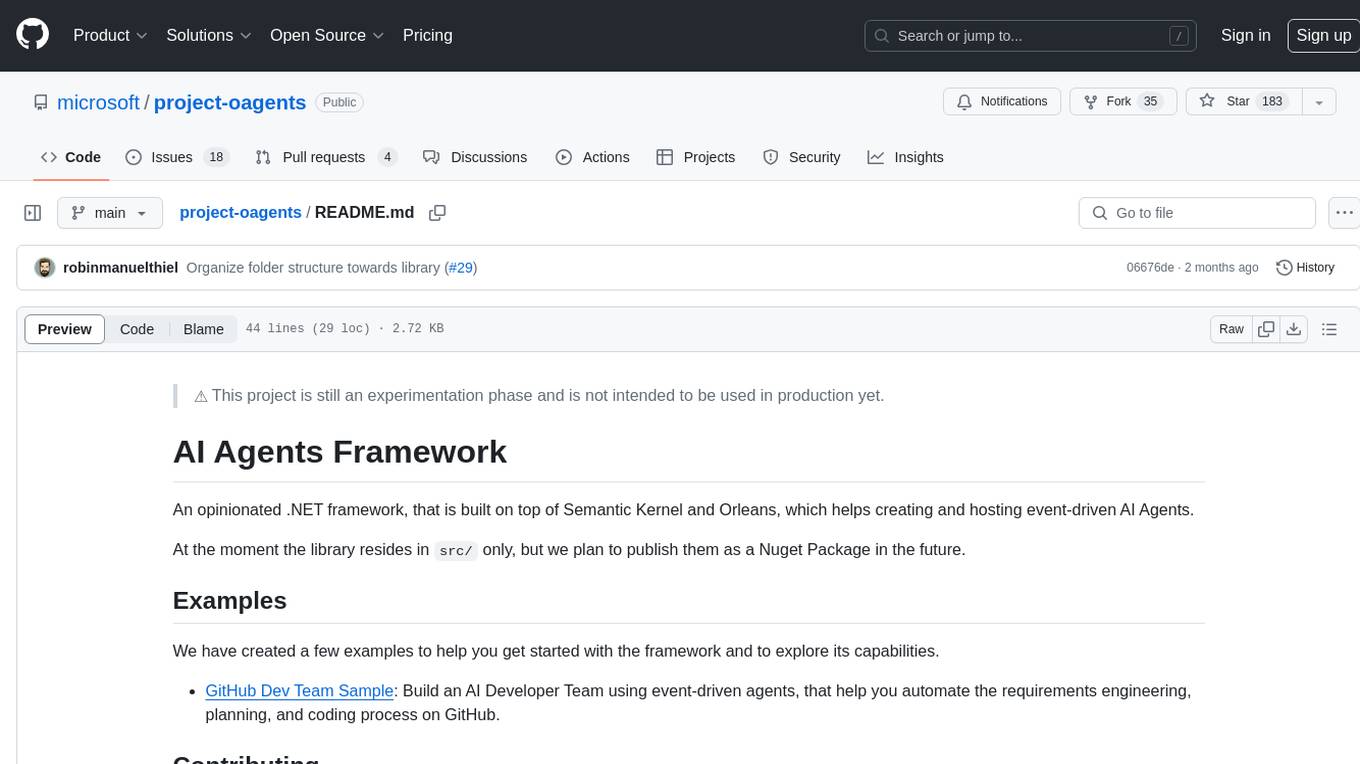
project-oagents
AI Agents Framework is a .NET framework built on Semantic Kernel and Orleans for creating and hosting event-driven AI Agents. It is currently in an experimental phase and not recommended for production use. The framework aims to automate requirements engineering, planning, and coding processes using event-driven agents.
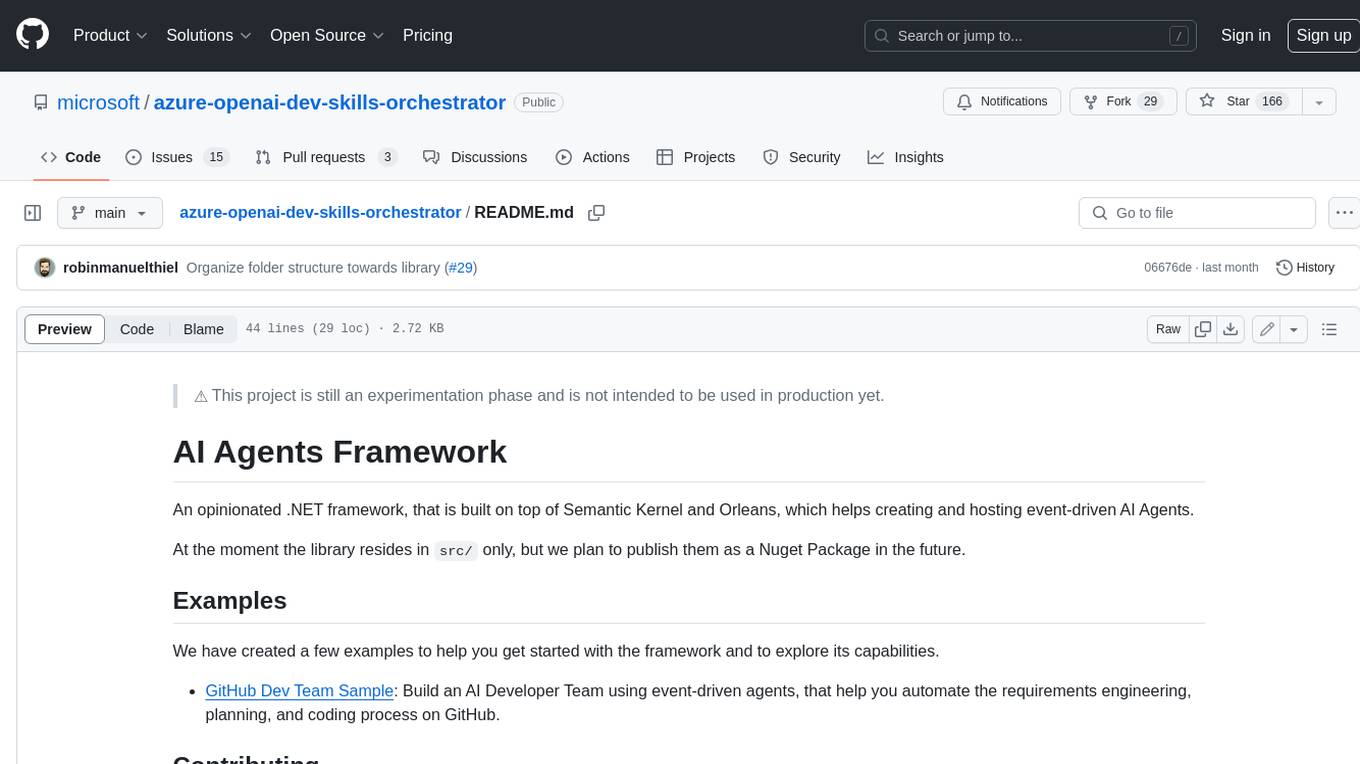
azure-openai-dev-skills-orchestrator
An opinionated .NET framework, that is built on top of Semantic Kernel and Orleans, which helps creating and hosting event-driven AI Agents.

learn-generative-ai
Learn Cloud Applied Generative AI Engineering (GenEng) is a course focusing on the application of generative AI technologies in various industries. The course covers topics such as the economic impact of generative AI, the role of developers in adopting and integrating generative AI technologies, and the future trends in generative AI. Students will learn about tools like OpenAI API, LangChain, and Pinecone, and how to build and deploy Large Language Models (LLMs) for different applications. The course also explores the convergence of generative AI with Web 3.0 and its potential implications for decentralized intelligence.
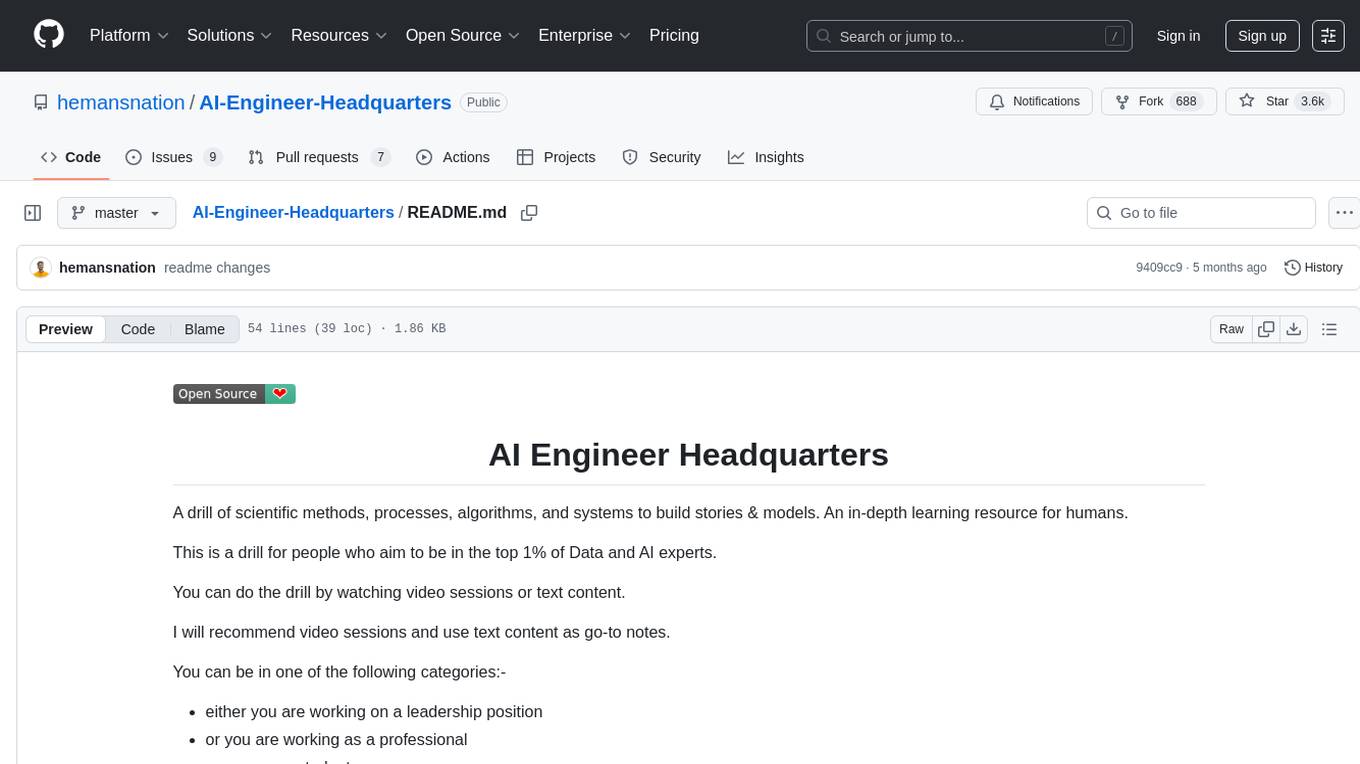
AI-Engineer-Headquarters
AI Engineer Headquarters is a comprehensive learning resource designed to help individuals master scientific methods, processes, algorithms, and systems to build stories and models in the field of Data and AI. The repository provides in-depth content through video sessions and text materials, catering to individuals aspiring to be in the top 1% of Data and AI experts. It covers various topics such as AI engineering foundations, large language models, retrieval-augmented generation, fine-tuning LLMs, reinforcement learning, ethical AI, agentic workflows, and career acceleration. The learning approach emphasizes action-oriented drills and routines, encouraging consistent effort and dedication to excel in the AI field.
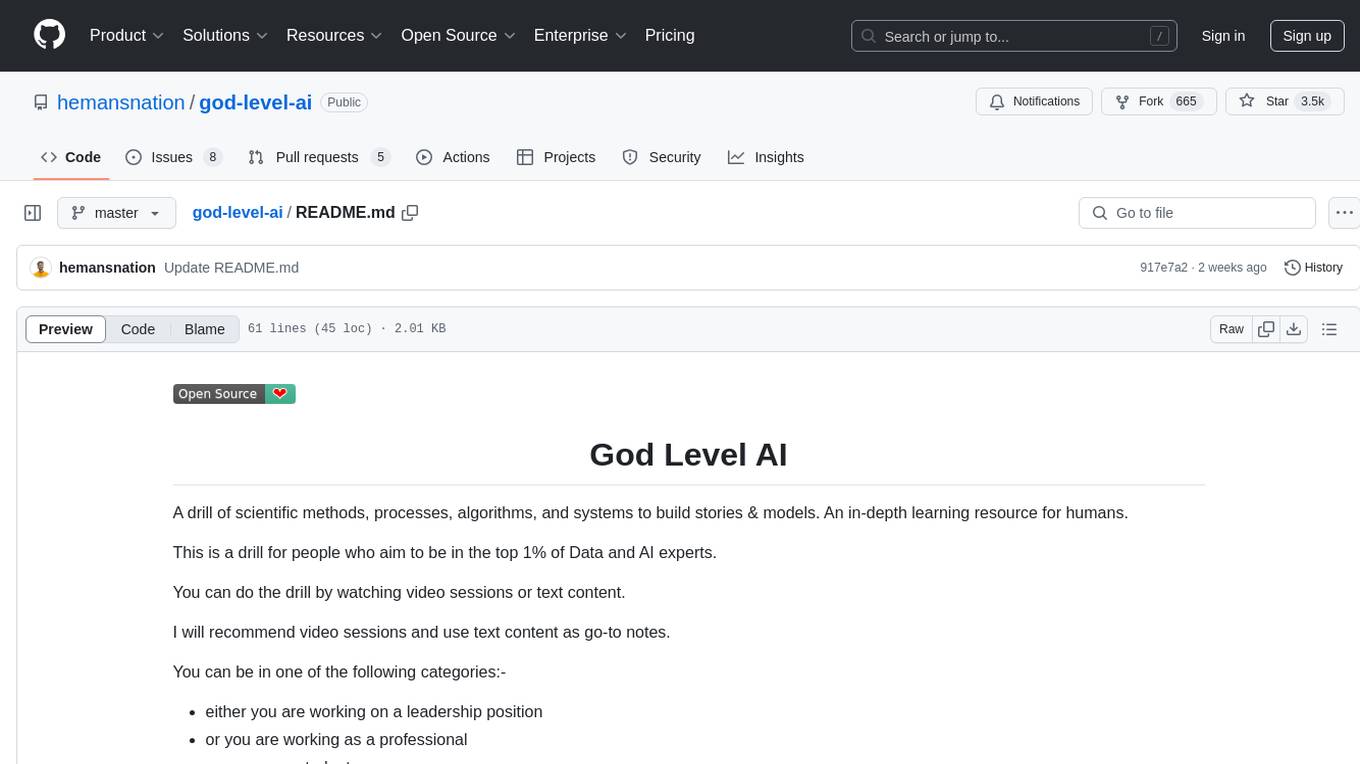
god-level-ai
A drill of scientific methods, processes, algorithms, and systems to build stories & models. An in-depth learning resource for humans. This is a drill for people who aim to be in the top 1% of Data and AI experts. The repository provides a routine for deep and shallow work sessions, covering topics from Python to AI/ML System Design and Personal Branding & Portfolio. It emphasizes the importance of continuous effort and action in the tech field.
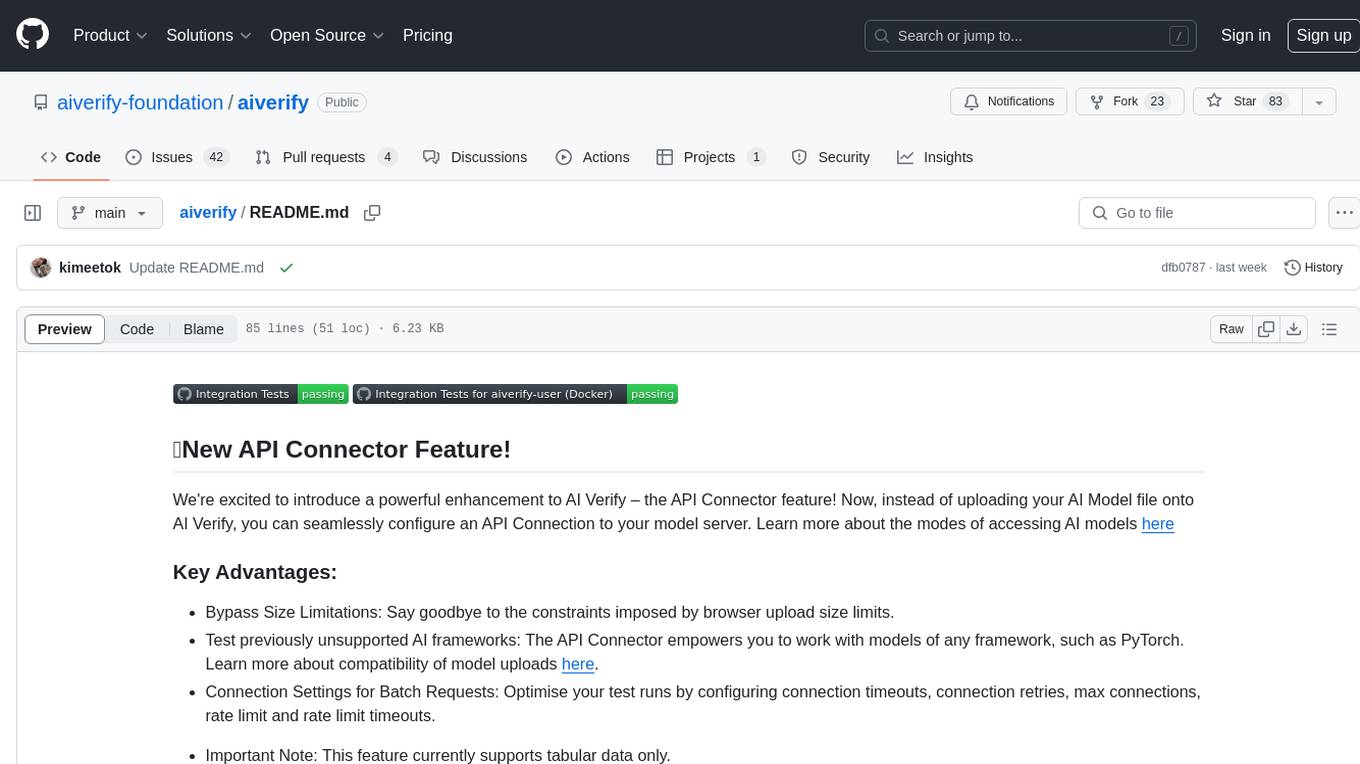
aiverify
AI Verify is an AI governance testing framework and software toolkit that validates the performance of AI systems against internationally recognised principles through standardised tests. It offers a new API Connector feature to bypass size limitations, test various AI frameworks, and configure connection settings for batch requests. The toolkit operates within an enterprise environment, conducting technical tests on common supervised learning models for tabular and image datasets. It does not define AI ethical standards or guarantee complete safety from risks or biases.
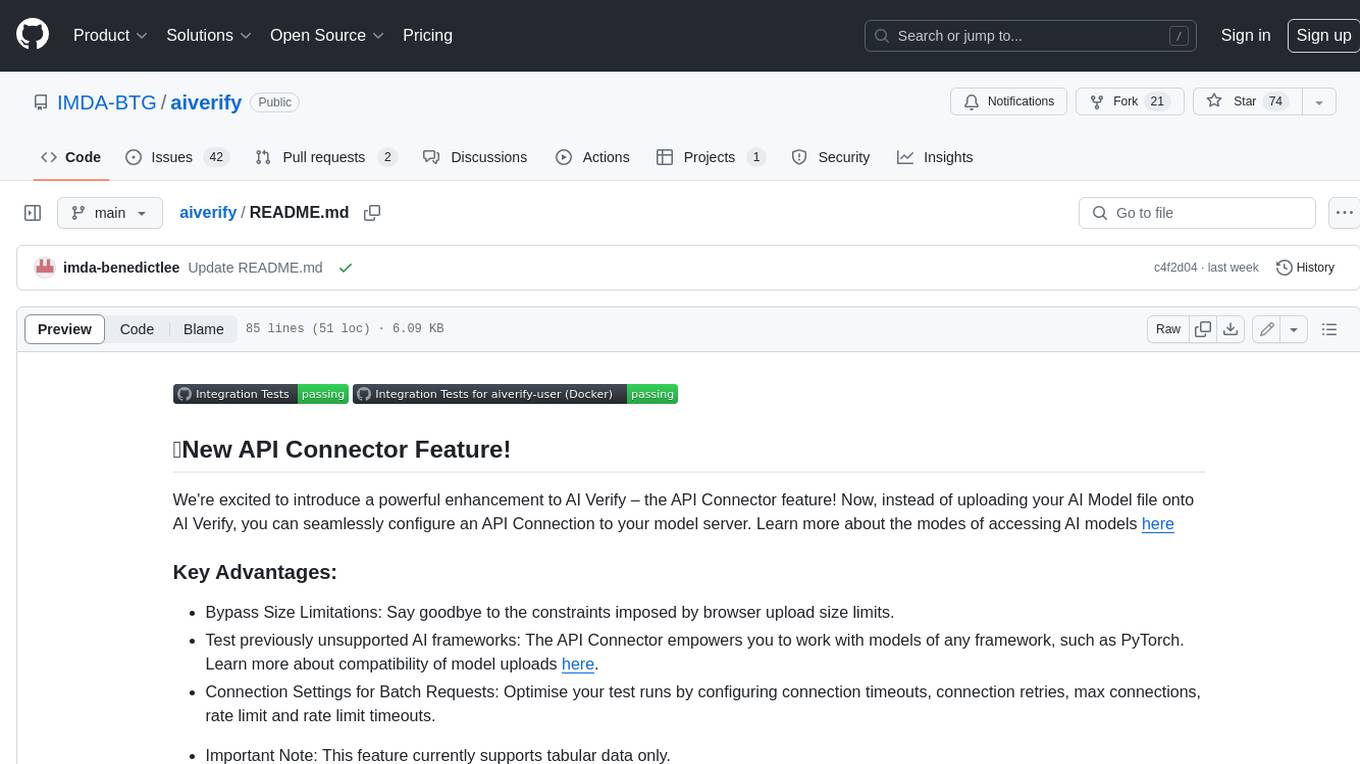
aiverify
AI Verify is an AI governance testing framework and software toolkit that validates the performance of AI systems against a set of internationally recognised principles through standardised tests. AI Verify is consistent with international AI governance frameworks such as those from European Union, OECD and Singapore. It is a single integrated toolkit that operates within an enterprise environment. It can perform technical tests on common supervised learning classification and regression models for most tabular and image datasets. It however does not define AI ethical standards and does not guarantee that any AI system tested will be free from risks or biases or is completely safe.
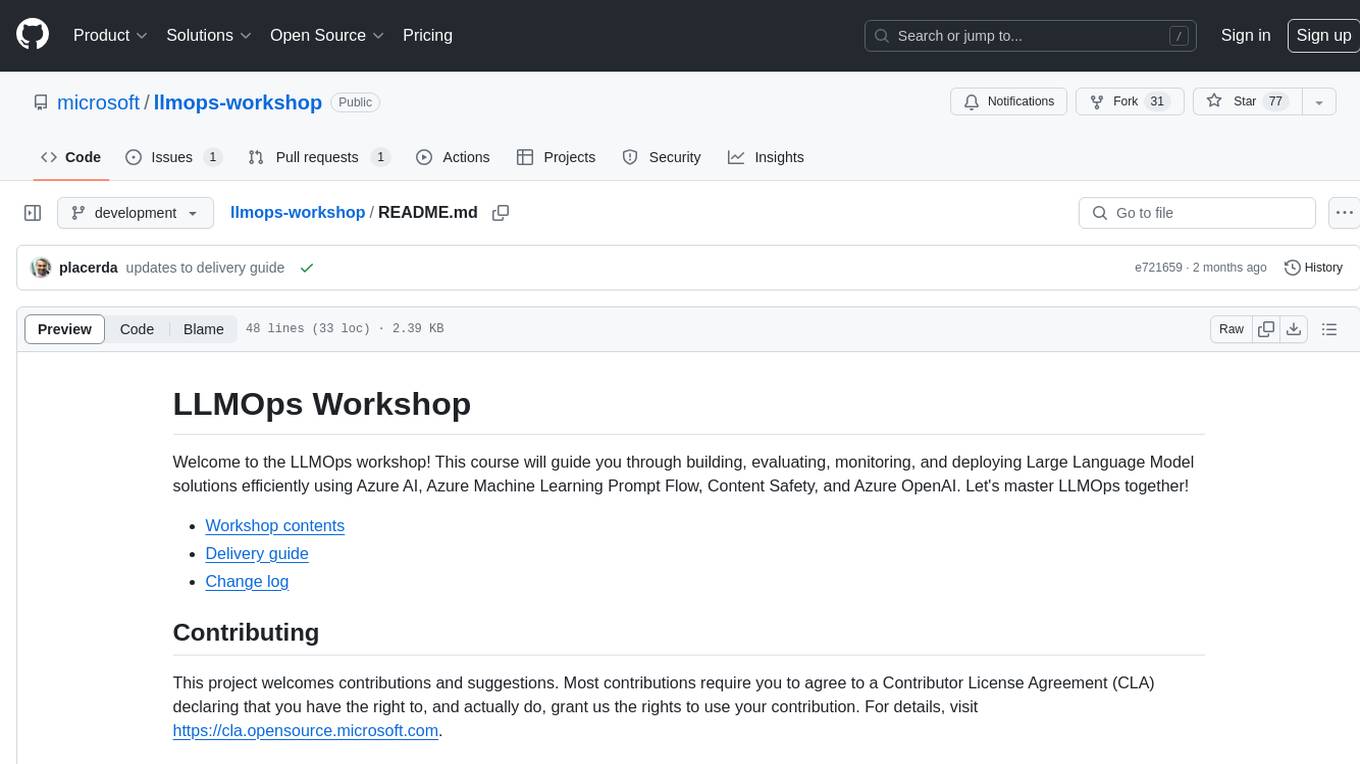
llmops-workshop
LLMOps Workshop is a course designed to help users build, evaluate, monitor, and deploy Large Language Model solutions efficiently using Azure AI, Azure Machine Learning Prompt Flow, Content Safety, and Azure OpenAI. The workshop covers various aspects of LLMOps to help users master the process.
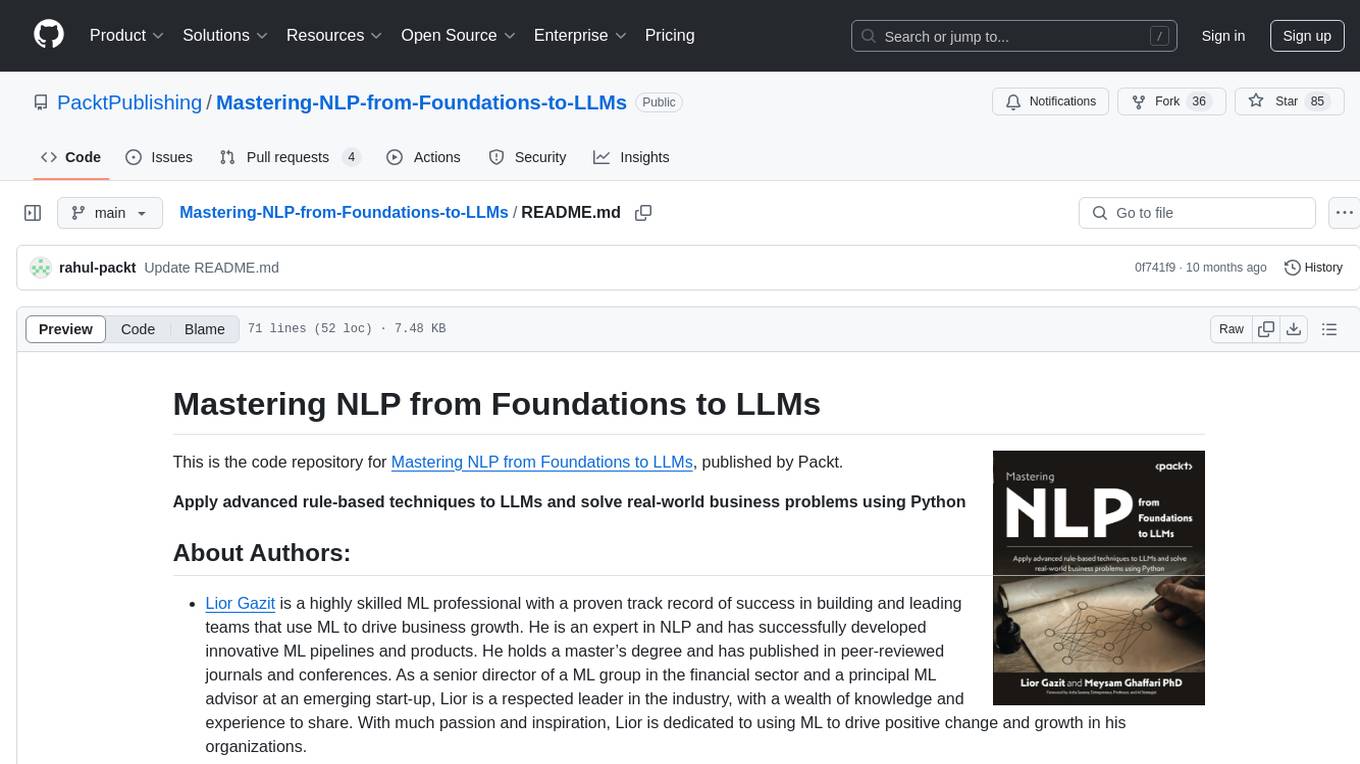
Mastering-NLP-from-Foundations-to-LLMs
This code repository is for the book 'Mastering NLP from Foundations to LLMs', which provides an in-depth introduction to Natural Language Processing (NLP) techniques. It covers mathematical foundations of machine learning, advanced NLP applications such as large language models (LLMs) and AI applications, as well as practical skills for working on real-world NLP business problems. The book includes Python code samples and expert insights into current and future trends in NLP.
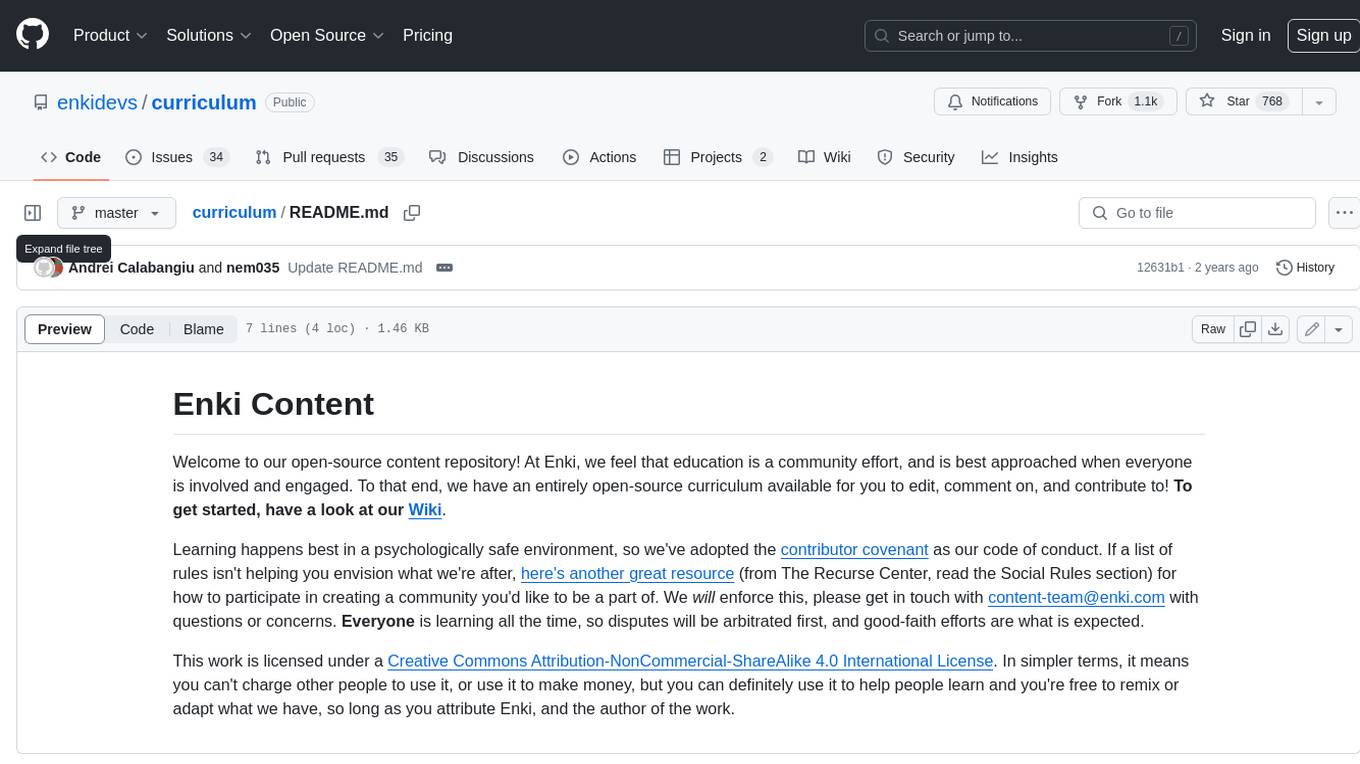
curriculum
The 'curriculum' repository is an open-source content repository by Enki, providing a community-driven curriculum for education. It follows a contributor covenant code of conduct to ensure a safe and engaging learning environment. The content is licensed under Creative Commons, allowing free use for non-commercial purposes with attribution to Enki and the author.
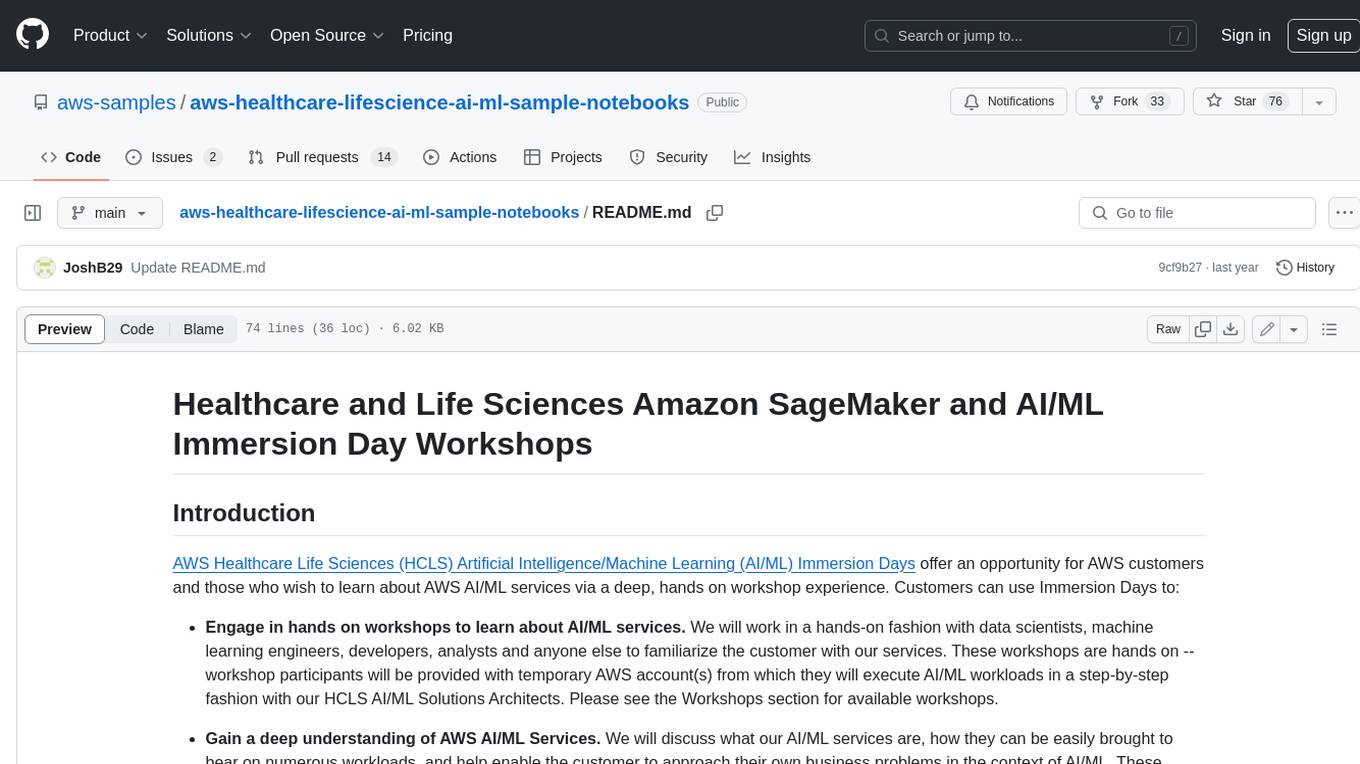
aws-healthcare-lifescience-ai-ml-sample-notebooks
The AWS Healthcare and Life Sciences AI/ML Immersion Day workshops provide hands-on experience for customers to learn about AI/ML services, gain a deep understanding of AWS AI/ML services, and understand best practices for using AI/ML in the context of HCLS applications. The workshops cater to individuals at all levels, from machine learning experts to developers and managers, and cover topics such as training, testing, MLOps, deployment practices, and software development life cycle in the context of AI/ML. The repository contains notebooks that can be used in AWS Instructure-Led Labs or self-paced labs, offering a comprehensive learning experience for integrating AI/ML into applications.
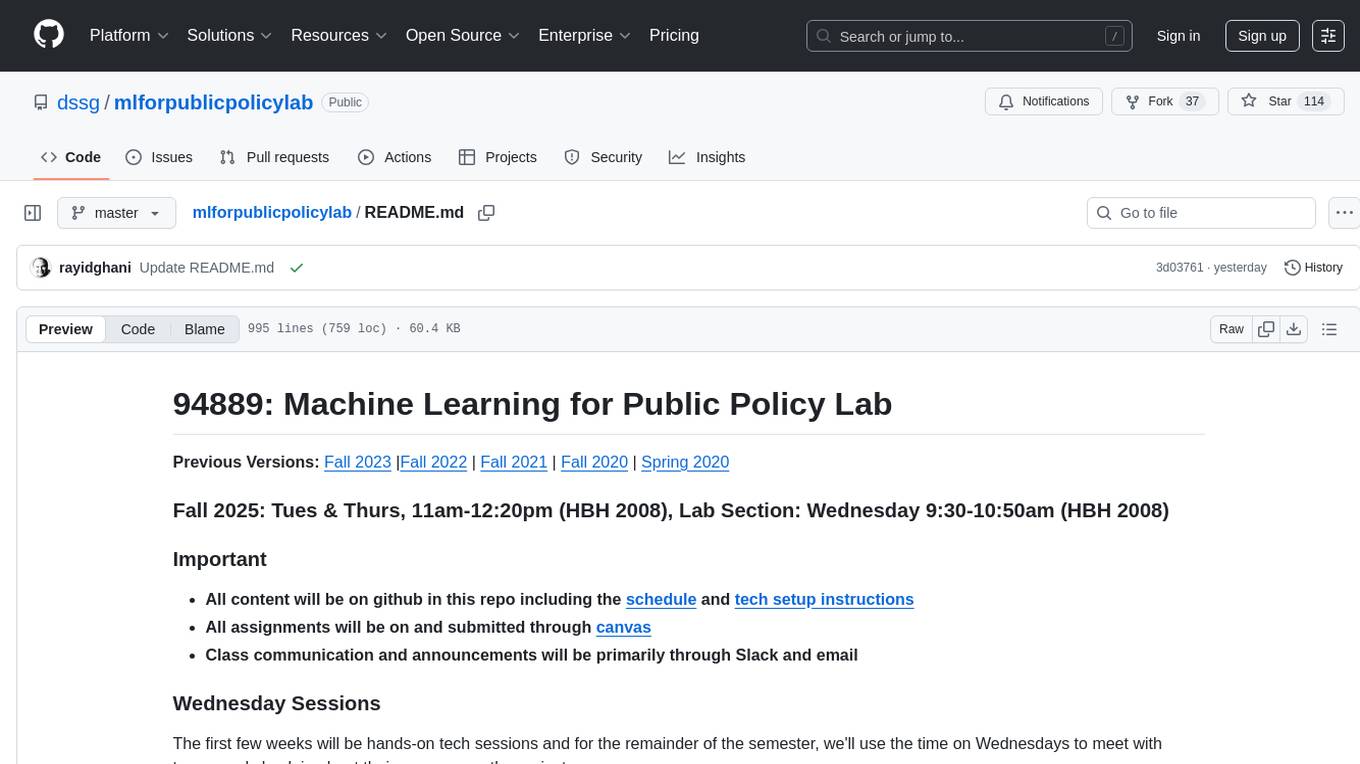
mlforpublicpolicylab
The Machine Learning for Public Policy Lab is a project-based course focused on solving real-world problems using machine learning in the context of public policy and social good. Students will gain hands-on experience building end-to-end machine learning systems, developing skills in problem formulation, working with messy data, communicating with non-technical stakeholders, model interpretability, and understanding algorithmic bias & disparities. The course covers topics such as project scoping, data acquisition, feature engineering, model evaluation, bias and fairness, and model interpretability. Students will work in small groups on policy projects, with graded components including project proposals, presentations, and final reports.

Lecture_AI_in_Automotive_Technology
This Github repository contains practice session materials for the TUM course on Artificial Intelligence in Automotive Technology. It includes coding examples used in the lectures to teach the foundations of AI in automotive technology. The repository aims to provide hands-on experience and practical knowledge in applying AI concepts to the automotive industry.
For similar tasks

ethical
The repository 'ethical' contains the live website for The Institute for Ethical AI & Machine Learning. It provides information about the institute, the Ethical ML Network, and the 8 Machine Learning Principles. The repository is open for contributions by the community through pull requests or issue submissions.
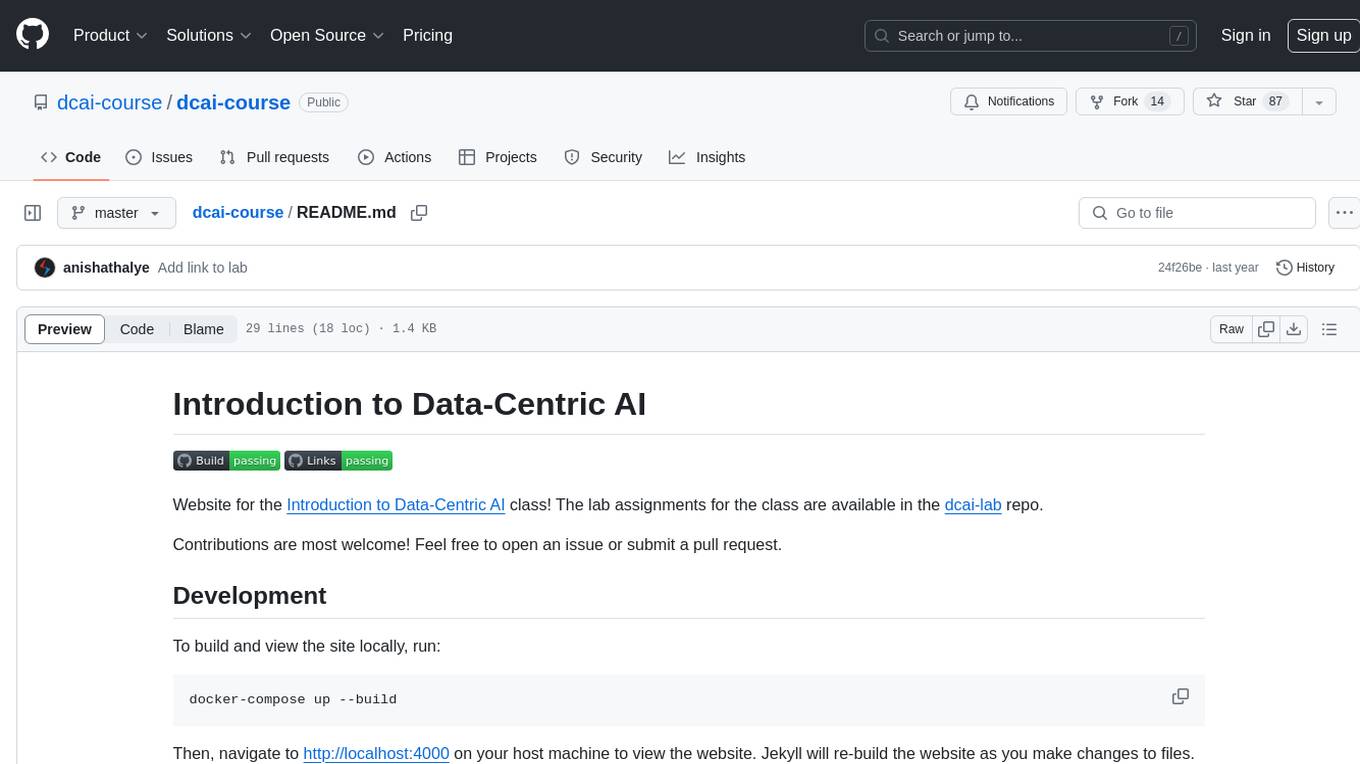
dcai-course
This repository serves as the website for the Introduction to Data-Centric AI class. It contains lab assignments and resources for the course. Users can contribute by opening issues or submitting pull requests. The website can be built locally using Docker and Jekyll. The design is based on Missing Semester. All contents, including source code, lecture notes, and videos, are licensed under CC BY-NC-SA 4.0.
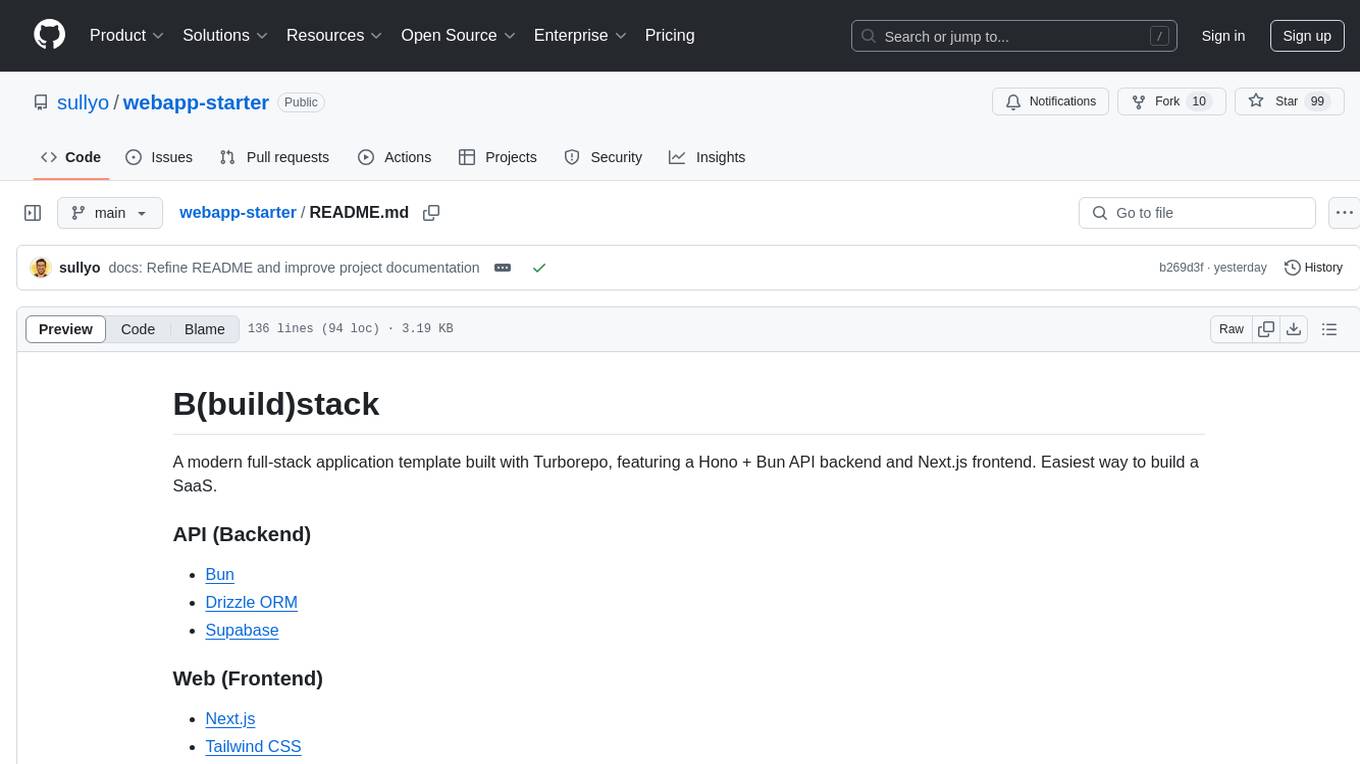
webapp-starter
webapp-starter is a modern full-stack application template built with Turborepo, featuring a Hono + Bun API backend and Next.js frontend. It provides an easy way to build a SaaS product. The backend utilizes technologies like Bun, Drizzle ORM, and Supabase, while the frontend is built with Next.js, Tailwind CSS, Shadcn/ui, and Clerk. Deployment can be done using Vercel and Render. The project structure includes separate directories for API backend and Next.js frontend, along with shared packages for the main database. Setup involves installing dependencies, configuring environment variables, and setting up services like Bun, Supabase, and Clerk. Development can be done using 'turbo dev' command, and deployment instructions are provided for Vercel and Render. Contributions are welcome through pull requests.
For similar jobs
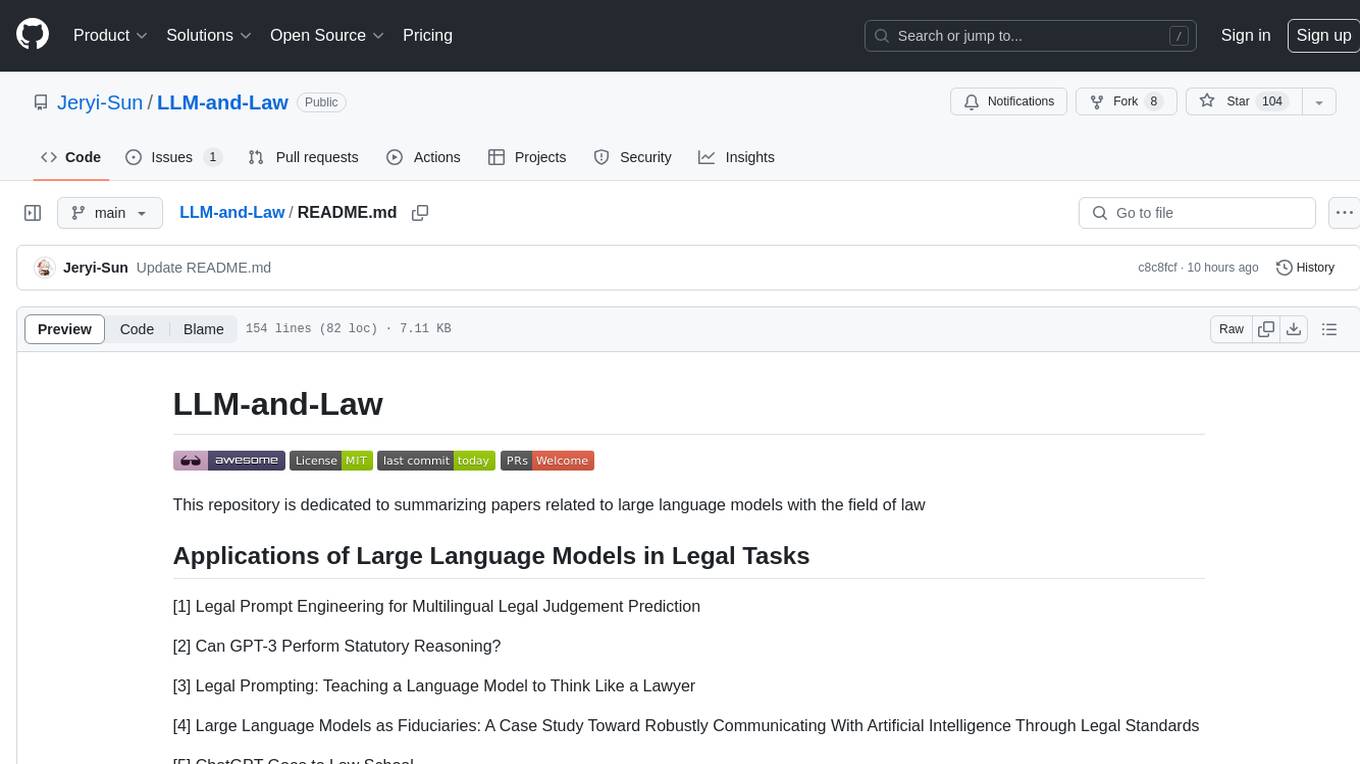
LLM-and-Law
This repository is dedicated to summarizing papers related to large language models with the field of law. It includes applications of large language models in legal tasks, legal agents, legal problems of large language models, data resources for large language models in law, law LLMs, and evaluation of large language models in the legal domain.
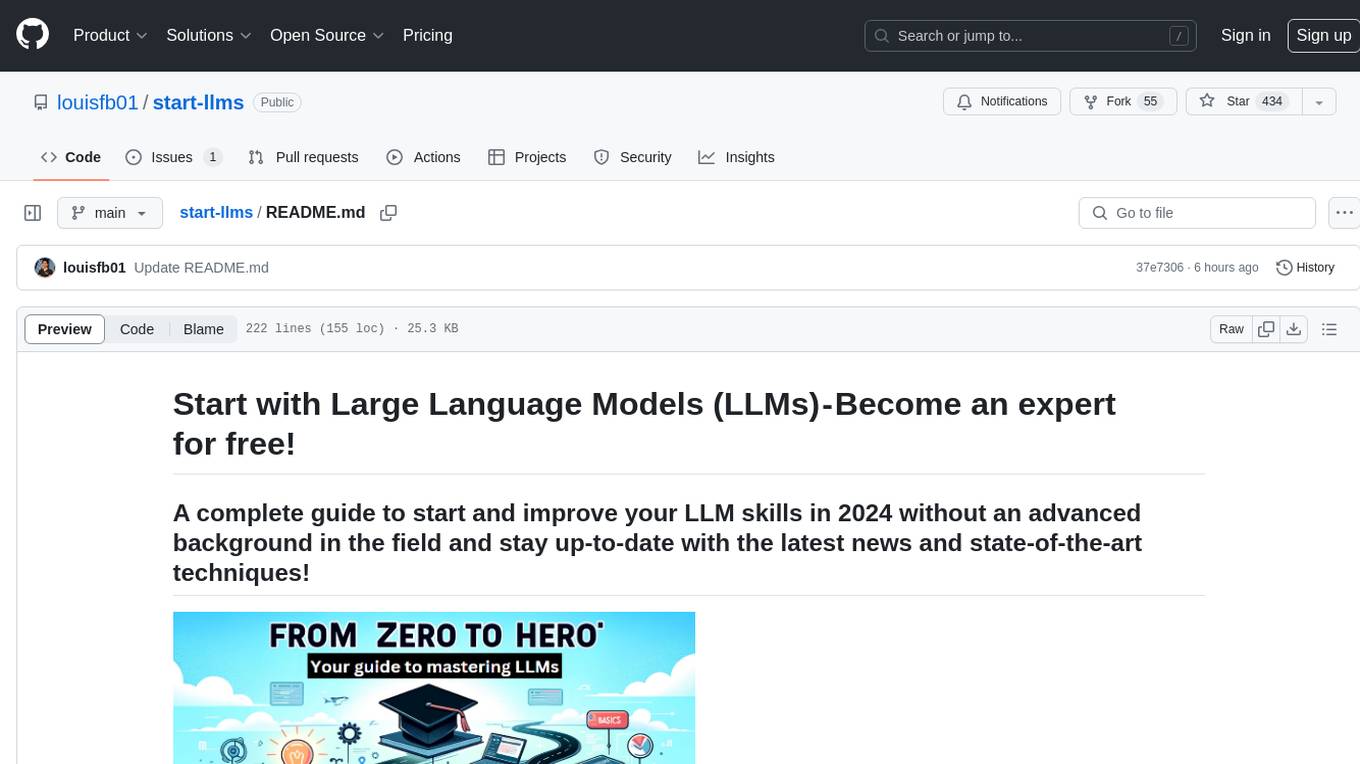
start-llms
This repository is a comprehensive guide for individuals looking to start and improve their skills in Large Language Models (LLMs) without an advanced background in the field. It provides free resources, online courses, books, articles, and practical tips to become an expert in machine learning. The guide covers topics such as terminology, transformers, prompting, retrieval augmented generation (RAG), and more. It also includes recommendations for podcasts, YouTube videos, and communities to stay updated with the latest news in AI and LLMs.

aiverify
AI Verify is an AI governance testing framework and software toolkit that validates the performance of AI systems against internationally recognised principles through standardised tests. It offers a new API Connector feature to bypass size limitations, test various AI frameworks, and configure connection settings for batch requests. The toolkit operates within an enterprise environment, conducting technical tests on common supervised learning models for tabular and image datasets. It does not define AI ethical standards or guarantee complete safety from risks or biases.
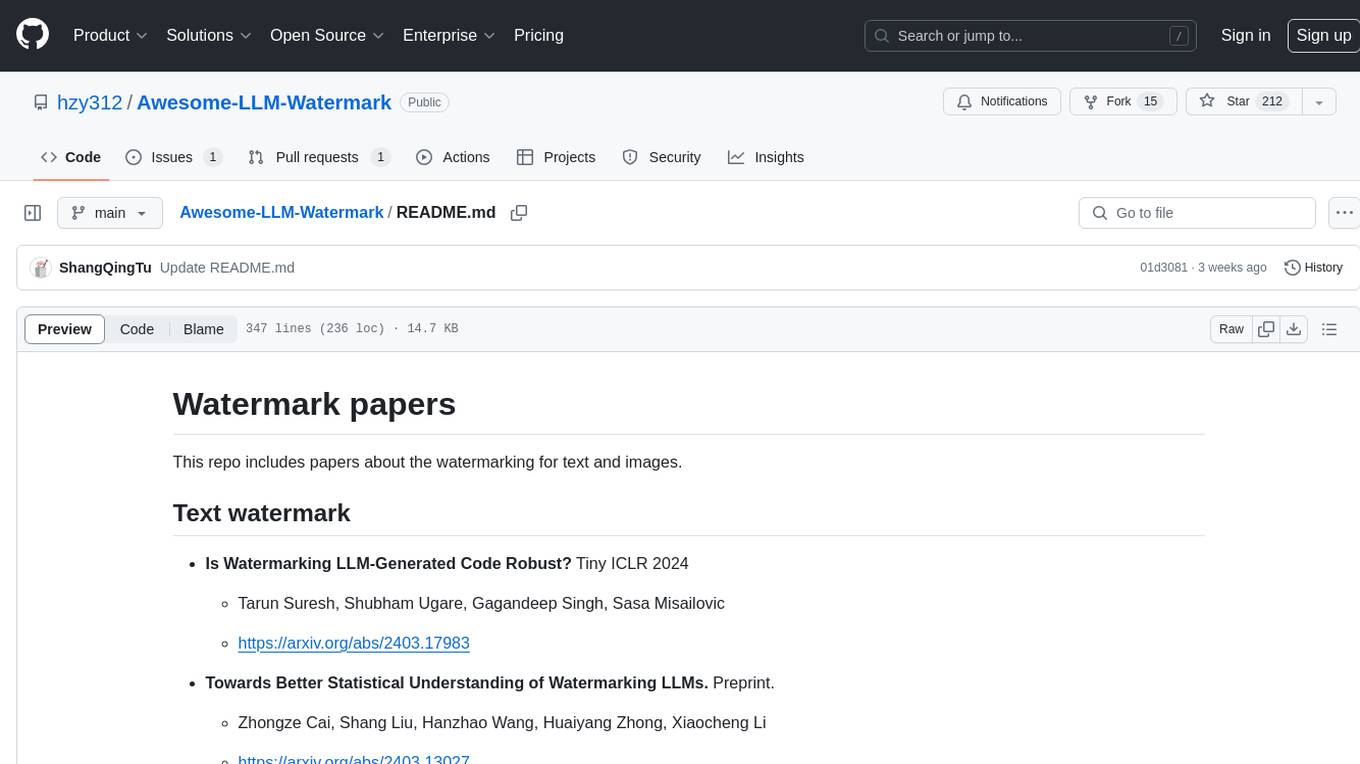
Awesome-LLM-Watermark
This repository contains a collection of research papers related to watermarking techniques for text and images, specifically focusing on large language models (LLMs). The papers cover various aspects of watermarking LLM-generated content, including robustness, statistical understanding, topic-based watermarks, quality-detection trade-offs, dual watermarks, watermark collision, and more. Researchers have explored different methods and frameworks for watermarking LLMs to protect intellectual property, detect machine-generated text, improve generation quality, and evaluate watermarking techniques. The repository serves as a valuable resource for those interested in the field of watermarking for LLMs.
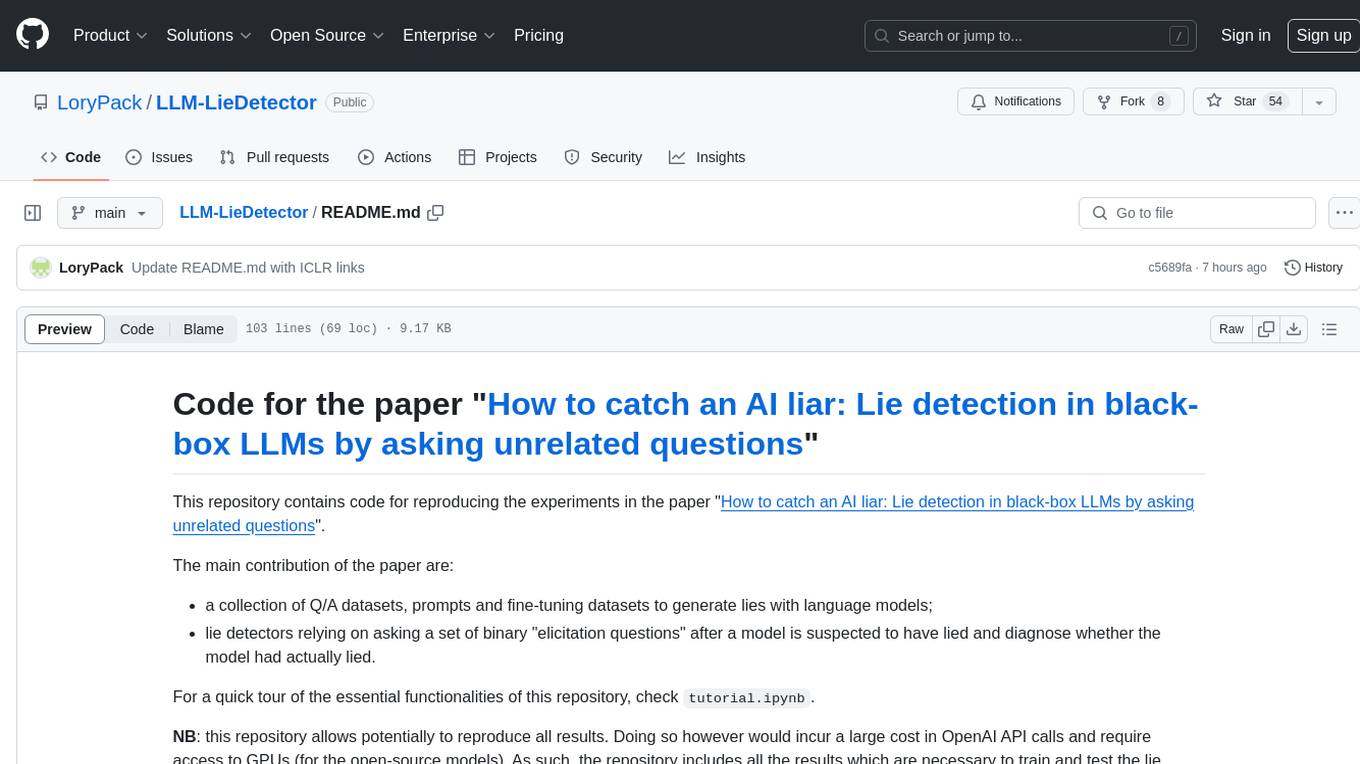
LLM-LieDetector
This repository contains code for reproducing experiments on lie detection in black-box LLMs by asking unrelated questions. It includes Q/A datasets, prompts, and fine-tuning datasets for generating lies with language models. The lie detectors rely on asking binary 'elicitation questions' to diagnose whether the model has lied. The code covers generating lies from language models, training and testing lie detectors, and generalization experiments. It requires access to GPUs and OpenAI API calls for running experiments with open-source models. Results are stored in the repository for reproducibility.
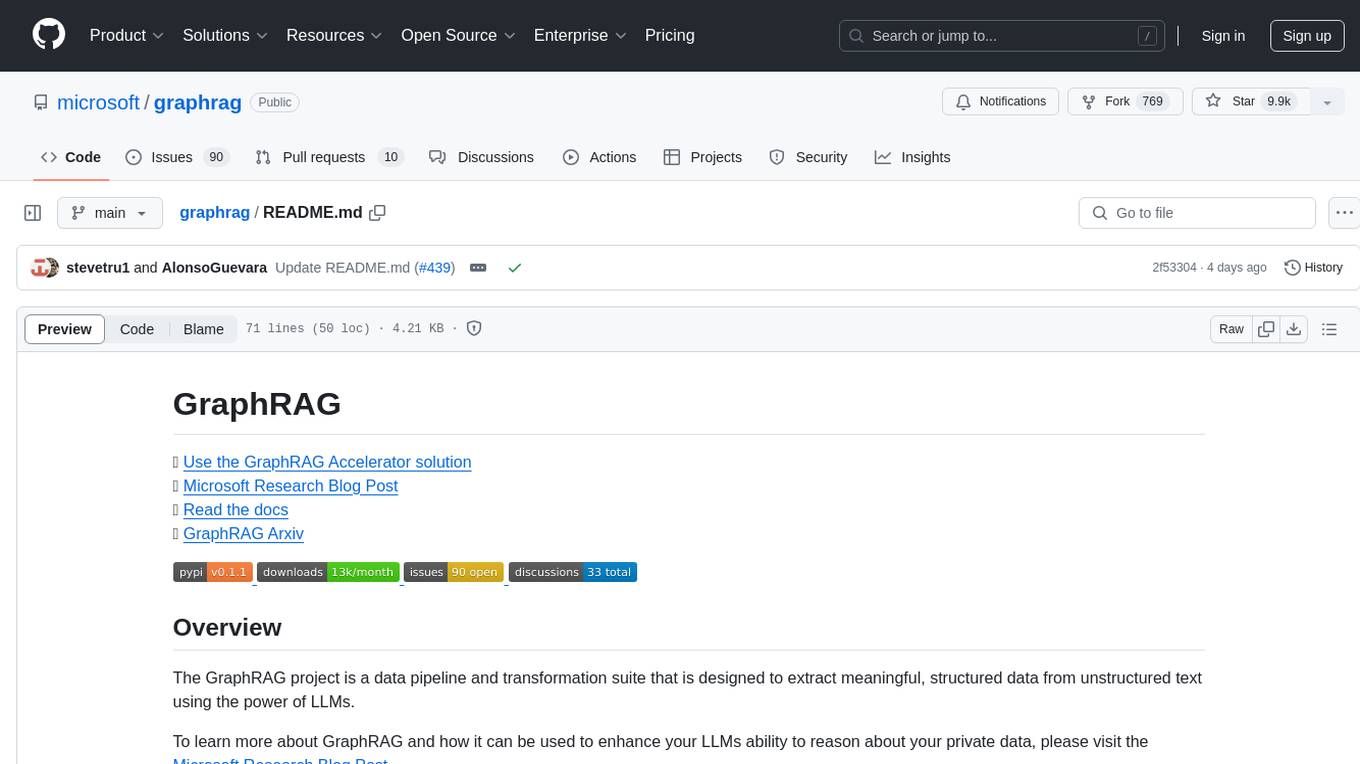
graphrag
The GraphRAG project is a data pipeline and transformation suite designed to extract meaningful, structured data from unstructured text using LLMs. It enhances LLMs' ability to reason about private data. The repository provides guidance on using knowledge graph memory structures to enhance LLM outputs, with a warning about the potential costs of GraphRAG indexing. It offers contribution guidelines, development resources, and encourages prompt tuning for optimal results. The Responsible AI FAQ addresses GraphRAG's capabilities, intended uses, evaluation metrics, limitations, and operational factors for effective and responsible use.
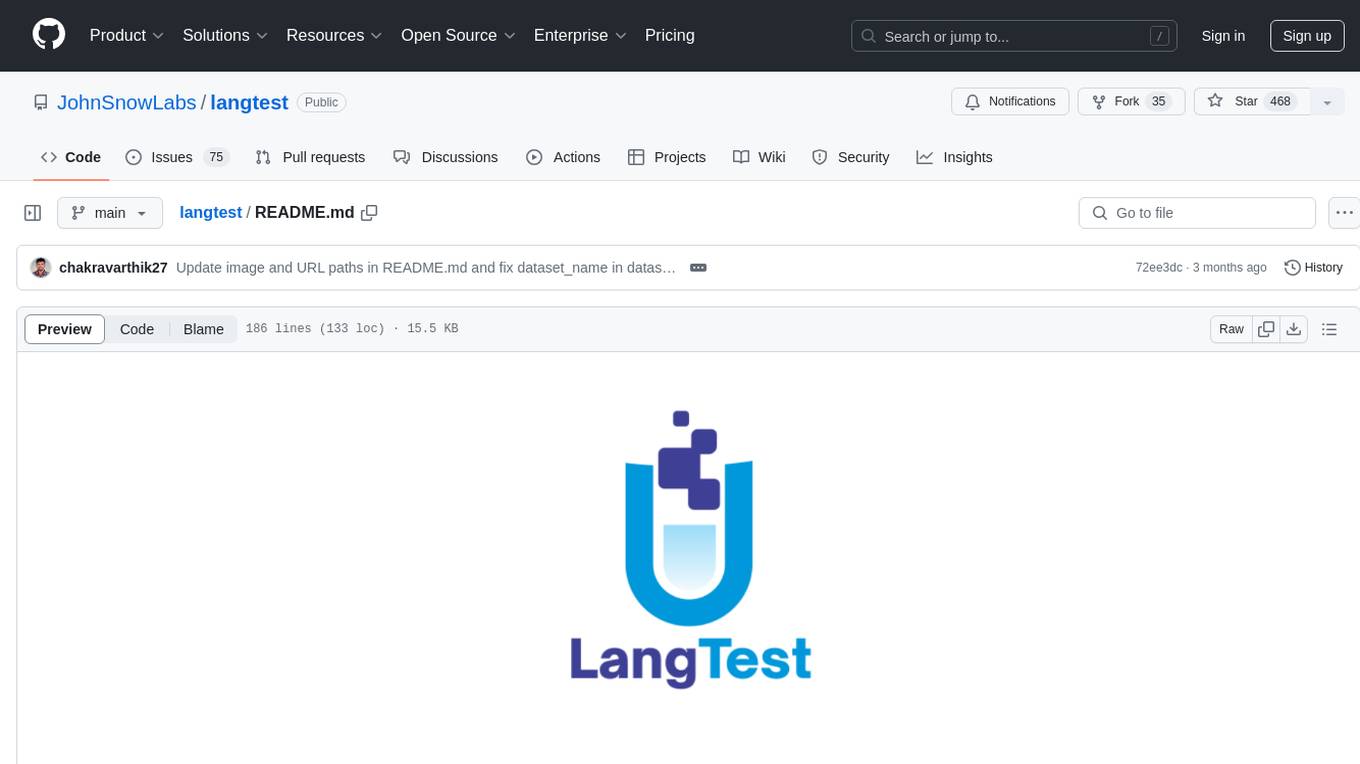
langtest
LangTest is a comprehensive evaluation library for custom LLM and NLP models. It aims to deliver safe and effective language models by providing tools to test model quality, augment training data, and support popular NLP frameworks. LangTest comes with benchmark datasets to challenge and enhance language models, ensuring peak performance in various linguistic tasks. The tool offers more than 60 distinct types of tests with just one line of code, covering aspects like robustness, bias, representation, fairness, and accuracy. It supports testing LLMS for question answering, toxicity, clinical tests, legal support, factuality, sycophancy, and summarization.
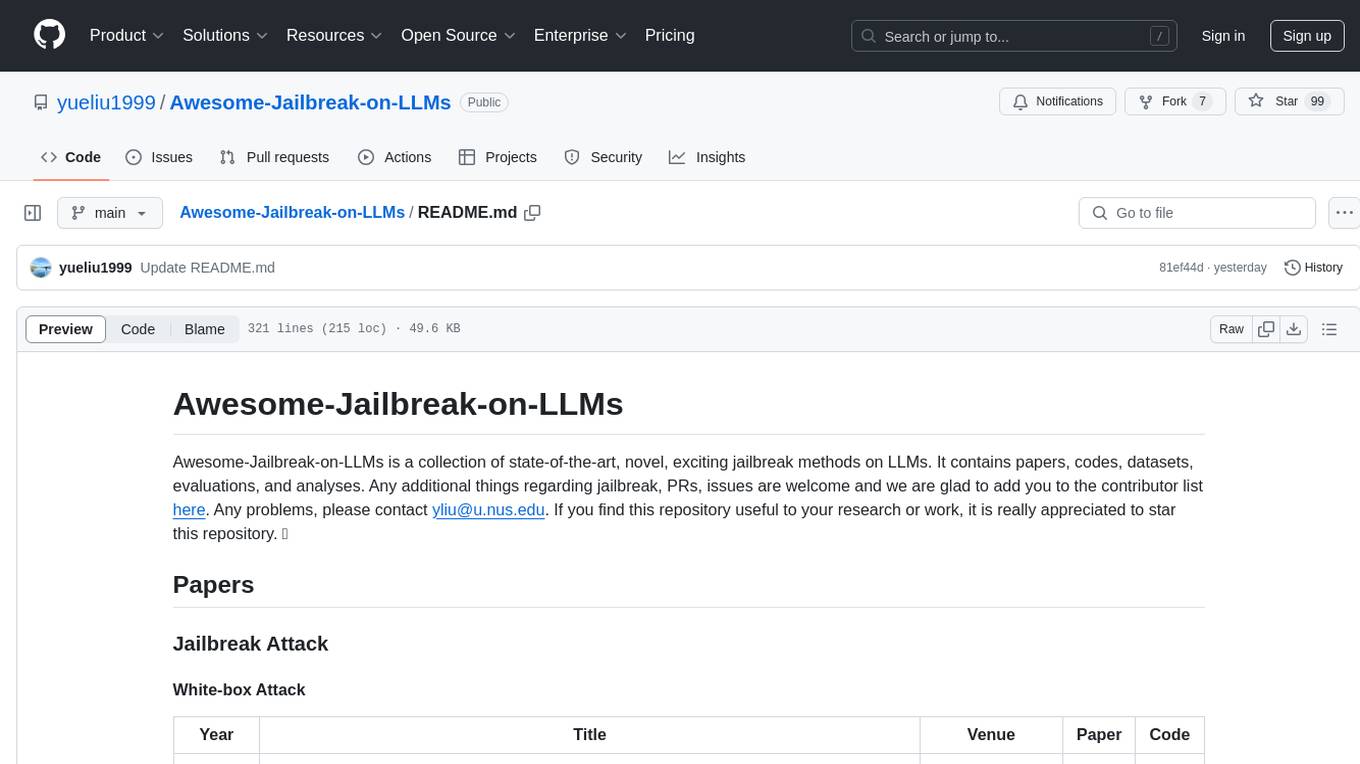
Awesome-Jailbreak-on-LLMs
Awesome-Jailbreak-on-LLMs is a collection of state-of-the-art, novel, and exciting jailbreak methods on Large Language Models (LLMs). The repository contains papers, codes, datasets, evaluations, and analyses related to jailbreak attacks on LLMs. It serves as a comprehensive resource for researchers and practitioners interested in exploring various jailbreak techniques and defenses in the context of LLMs. Contributions such as additional jailbreak-related content, pull requests, and issue reports are welcome, and contributors are acknowledged. For any inquiries or issues, contact [email protected]. If you find this repository useful for your research or work, consider starring it to show appreciation.